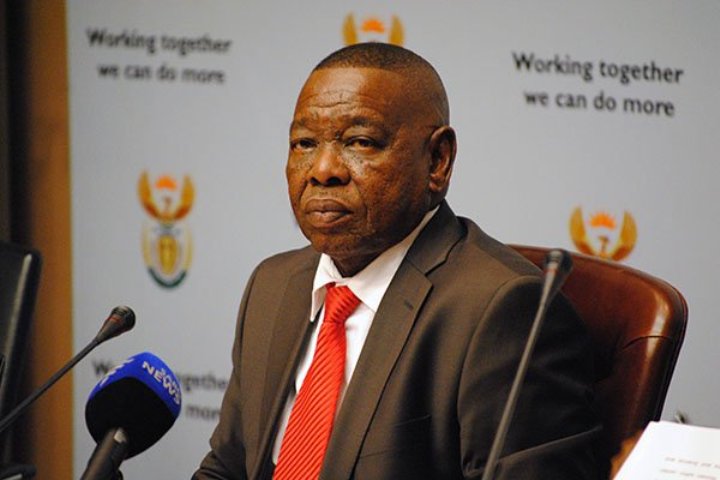Blade Nzimande Leads Delegation to Strengthen STI Ties with Tunisia, Algeria
A highlight of the Algeria leg is Minister Nzimande’s guest lecture on Pan-African STI cooperation, organised by the Algerian Ministry of Higher Education and Scientific Research.

- Country:
- Sao Tome and Principe
In a landmark diplomatic and developmental effort, South Africa’s Minister of Higher Education, Science, and Innovation, Professor Blade Nzimande, is leading a high-level delegation on a strategic visit to Tunisia and Algeria aimed at deepening science, technology, and innovation (STI) cooperation across the African continent.
The visits, which began on Monday, 14 July 2025, and will conclude on Thursday, mark a significant step in South Africa’s long-standing commitment to pan-African scientific collaboration and sustainable development. The official invitation was extended by Tunisia’s Minister of Higher Education and Scientific Research, Mondher Belaid, and Algeria’s Minister of Higher Education and Scientific Research, Kamel Bidari.
These bilateral engagements represent a key pillar in the Department of Science, Technology, and Innovation’s (DSTI) science diplomacy strategy, with a strong focus on expanding intra-African STI networks, developing sovereign scientific capabilities, and aligning national and regional development with the African Union’s Science, Technology and Innovation Strategy for Africa (STISA-2024).
Strategic Goals of the Visit
Minister Nzimande’s North African tour is intended to:
-
Reinforce and expand bilateral STI agreements with Tunisia and Algeria.
-
Promote joint initiatives in scientific research, innovation, and technological development.
-
Strengthen institutional linkages and knowledge exchange between South African research entities and their North African counterparts.
-
Support Africa’s collective capacity to respond to global scientific and technological challenges.
Speaking ahead of his visit, the Minister said:
“Our visit to Algeria and Tunisia forms part of our international relations strategy to strengthen meaningful science, technology and innovation cooperation with fellow African countries, and to advance the objectives of the African Union’s STI Strategy. We are working to build a sovereign STI agenda for Africa.”
Engagements in Tunisia: Showcasing Innovation and Culture
In Tunisia, Minister Nzimande’s delegation will engage in high-level bilateral meetings and visit critical innovation and research hubs, including:
-
Borj Cedria Technopark: A national hub for green technologies, energy, and biotechnology research.
-
Pasteur Institute of Tunis: A globally recognized biomedical research institution.
-
City of Science Museum: A major center for public science engagement, education, and awareness.
-
Bardo National Museum: Symbolizing Tunisia’s rich cultural heritage, underscoring the role of science in preserving history and identity.
These visits reflect a holistic approach to innovation, merging scientific advancement, societal engagement, and cultural preservation.
Advancing Technology Collaboration in Algeria
In Algeria, the delegation’s engagements are equally robust. Scheduled visits include:
-
Centre for the Development of Advanced Technologies (CDTA): A leading national center focusing on ICT, robotics, and applied physics.
-
Saad Dahlab University – Blida: One of Algeria’s major higher education institutions with advanced research programs.
-
Great Mosque of Algiers: A cultural and architectural marvel, representing the confluence of tradition and modernity.
A highlight of the Algeria leg is Minister Nzimande’s guest lecture on Pan-African STI cooperation, organised by the Algerian Ministry of Higher Education and Scientific Research. The lecture will address current geopolitical disruptions, the continent’s resilience, and the strategic need for scientific sovereignty and innovation-driven growth across Africa.
Concrete Outcomes: Plans of Action for Science Diplomacy
Both visits will culminate in the adoption of two new Plans of Action with Tunisia and Algeria respectively. These plans will outline immediate and long-term cooperative efforts, including:
-
Joint research projects
-
Mobility programs for students and scientists
-
Technology transfer initiatives
-
Shared innovation incubators and startup support frameworks
-
Climate science and sustainable development partnerships
The Department of Science, Technology, and Innovation has framed these actions as “concrete steps in implementing South Africa’s science diplomacy ambitions,” first detailed in Minister Nzimande’s recent Budget Vote speech in Parliament.
A Delegation of Scientific Leaders
The Minister is accompanied by a distinguished delegation comprising:
-
Senior officials from the Ministry and DSTI
-
Representatives from the Council for Scientific and Industrial Research (CSIR)
-
Leaders from the Technology Innovation Agency (TIA)
-
Experts from the Council for Mineral Technology (Mintek)
This collective brings not only political commitment but also deep technical expertise, ensuring that the engagements result in sustainable, practical partnerships with measurable impact.
Charting Africa’s STI Future
Amid global geopolitical shifts and technological transformation, the visit underscores the urgency of building resilient and self-sufficient African STI systems. Minister Nzimande has consistently championed a Pan-African approach to innovation—one that prioritises local solutions, strengthens continental supply chains, and fosters collaborative science.
“We must build a sovereign science, technology and innovation agenda for Africa. The future of our continent depends on our ability to innovate, educate, and cooperate on our own terms,” Nzimande concluded.
With these visits, South Africa is not only reaffirming its continental leadership in science and technology but is also laying the groundwork for a unified, empowered, and innovation-driven African future.










